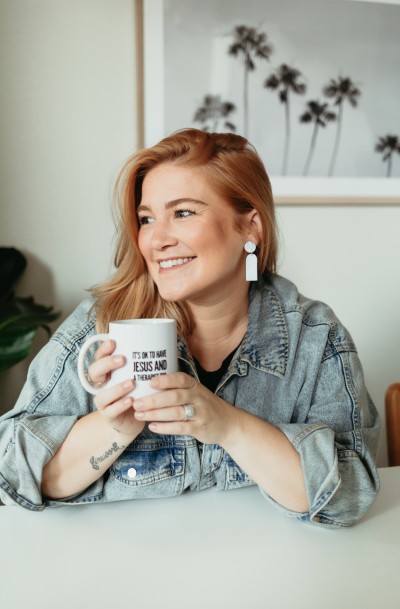
ADHD In Women

Written by Emily Sharp Lawrence
Do you constantly feel like you need to apologize for who and how you are? There’s an unspoken but understood “normal” in our culture that no longer serves us. The idea that we all learn the same way and would be perfectly holistically healthy with just nutrition and fitness is not the only way. Some of us fit nicely into society’s expectations for us and the anticipated route to success, but some don’t. Our beautiful brains come in so many different variations of the amazing miracle that is the brain.

Us women who fall under the enormous umbrella of having neurologically atypical thought patterns and behaviors are typically highly intuitive women.
From early on, I had an understanding that my brain and body seemed to function in a way that wasn’t helpful to me in the settings I was expected to succeed in. Here enters the first message that led to a lack of self-trust. Why am I the only student who seems to be in pain trying to sit still or make it to the end of the school day? I couldn’t trust myself to comfortably execute the goals the other kids were seemingly doing with ease. For example, reading The Hobbit—I will never forget the self-hate-filled thoughts I had while I tried and tried to sit still long enough to read the homework chapters from a book that didn’t interest me. That’s the thing about us ADHD kids: we are brilliant and bored. If you had handed me a historical fiction book about WWII, I would have finished it by the following day and asked for more just like it.
The missing piece seemed to be a lack of motivation for things that I had no interest in. That’s especially challenging as a child, because you’re still learning your interests and they’re constantly changing. I knew that I was a people-person, and I loved people hard. This meant I loved to talk! I loved to connect—and instead of that being understood as a gift and having boundaries for it to support the classroom, I was immediately given daily detentions for talking and labeled the student you hoped wouldn’t be in your class.
Growing up in Catholic school made an ADHD diagnosis nearly impossible. Those of us who required different resources or the option to stand, fidget, or take a walk were immediately classified as the “bad kids.” We were the frustrating students who were labeled at the beginning of school, and that label followed us until college as teachers passed that label up each year as a warning. My little brother would hear things like, “Let’s just hope you can focus better than your sister!” or “I hope you talk a little less than your sister!” My inability to sit still led to me drawing circles around the border in each page of my notebook and then going back to fill them in, or tallying the seconds and grouping up each minute of tallies on the covers of my textbooks. I would write notes to my mom and each of my friends to help me feel like I could maybe make it through the first half of class without using my coveted bathroom break pass. I knew I would likely be allotted ONE pass each class period, and then I could take a walk through the halls, stand in the bathroom and spark up conversation with the other girls who were there.
Miraculously, because of my references and extracurricular activities, I was accepted into college. That’s where I really learned that I can trust my brain, it is beautiful, and there has always been intelligence and creativity in me just waiting to be accessed in a space where I can thrive. College means selecting a major, or an “interest.” As a people-person with a love for building connections, cultivating community wellness, empathy, and empowering those who felt on the outside, I chose social work. I graduated with my bachelor’s and master’s degrees in five years after being accepted into the advanced standing master’s program, which is completed in one year. I achieved this because I was interested. I was focused. I was determined. College also allows you the opportunity to pick your classes. No more having eight fifty-minute, back-to-back subjects per day. I could get curious about a topic in class and then go to the library and learn everything I could about that topic by the end of the day. The schedule supported space, studying outside in the quad, being surrounded by friends, more classroom discussion, and writing essay tests to showcase my understanding of the research and science instead of answering multiple-choice questions about the details in The Hobbit.
Us women who fall under the enormous umbrella of having neurologically atypical thought patterns and behaviors are typically highly intuitive women. We received that message of “different” early on and began our journey of self-love IN SPITE OF what we were hearing about how and who we are. We learned a deep sense of empathy and compassion early on and therefore grow to be highly sensitive and socially aware people. We are often the helpers, the social workers, the therapists, the teachers, the leaders… we choose to advocate for and celebrate the “underdogs” of society. The vulnerable ones who never really got to choose vulnerability because our “differences/weaknesses” were like our heart on our sleeve, visible and available for comments.
There are plenty of people who don’t understand. I would say that most people don’t. There’s the ongoing joking about “I’m so ADD!” whenever you find yourself jumping from conversation to conversation. Or the abuse of ADD/ADHD medication by people who are neurotypical who want to upcharge their brain to focus at an unnatural rate or to keep their mind off their appetite. The stigma surrounding ADHD is that “everybody’s got that now” or “they’ll give any kid an ADD diagnosis”— this belief makes it very difficult for adults to decide when it’s time to try medication to make their lives easier and their minds and bodies healthier instead of torturing themselves in a constant state of stress, shame, and self-hate.
The truth is, nobody wants to have to be on medication to have enough motivation to do the laundry. Read that sentence again. Aren’t you exhausted? Women with ADHD are, too.
If you don’t fit the expected template, life is full of constant feelings that you are failing. In reality, you may just need a different opportunity. For many of us, it feels like everything has to be urgent in order for it to get done. “I thrive in chaos” is not a professional strength, but trust me, it can present as one. The issue with thriving in chaos and urgency is the toll that takes on your nervous system. Your body is trained to be in a constant state of stress.
Motivation feels impossible. I’ll be honest—I’m not sure I’ve ever experienced motivation. I have to talk myself into every simple task I do all day long. ADHD often leads to increased depression and anxiety brought on by shame and exhaustion from trying to support yourself in a world that seems to work for everyone else. This all may sound dramatic to you, and I can understand that. For hundreds of years, women have been shushed because our ADHD symptoms can align with the misogynistic stereotypes put on women. We can appear to be just a woman who “needs to calm down,” is “too sensitive,” “too emotional,” “talks too much,” “can’t sit still,” is “lazy” or “crazy.” Meanwhile, men with ADHD are diagnosed MUCH faster because their symptoms are taken more seriously as they can present in a way that doesn’t support societies’ expectation of their gender-stereotype.
I’ve found some tools over the years of having to do my own research because of a severe lack in research done on ADHD in adult women. This involves being super intentional about creating a home for myself and my family that feels incredibly safe and cozy in ways that support a reset for my nervous system each day. I set expectations for myself that I can control (the same candle to provide consistent scent, the texture of the comforter on my bed, the temperature setting in our home, etc.) These things provide consistency in my environment that help my mind find less distraction. My home is organized in a way where everything has a specific place—this means adopting the mantra “don’t put it down, put it away.” Clutter is very distracting! My most-used resource for motivation is an exercise called “body doubling.” Body doubling is a productivity strategy that includes inviting someone to sit quietly with us while we focus on our task. This is not someone who pushes you to stay focused. Rather, this person is with you because if someone was there watching you start to organize your Christmas decorations in May while cooking dinner, you probably wouldn’t do that. You’d stay focused on dinner.
For more helpful and relatable resources, tools, and advice, I invite you to check out Jessica McCabe’s TEDx talk: Failing at Normal. She has a YouTube series for us ADHD women called How To ADHD. These videos have been essential in helping me build a life filled with ideas and theories that benefit the way my brain works!
Here’s what I have to say, dear sister. If you are relating to what I’m saying; if you’re tired of feeling like you have to explain who and how you are; if you’re tired of feeling like you’re not like everyone else: I have something to tell you. You’re not like anyone else. You are a beautiful and brilliant heavenly magic all your own. You don’t need to fit into the uncomfortable box anymore. The world is big enough and sweet enough for you to take up more space, be yourself fully, and stop apologizing for how God made you. He delights in all that you do, in your curiosity, your enthusiasm, your extremes, the way you feel joy for others deep down in your soul, the way you celebrate things BIG.
There are other ways to take care of yourself than the few that are encouraged to the world as a whole. There are ways to breathe, stretch, and grow that are just waiting for you because they exist to serve you and all your magic. I’m so proud of you. God is so proud of you. You’re not alone; I get it. Know that I’m praying for us!
I’m believing the world will learn more about the differences that make us all so lovable. It takes us sharing our stories for “normal” to change to “this is me!”
Related Articles
What I’ve Learned as a Therapist (Part 3): Do the Thing
If left to my own devices, I would live entirely in my head. I would imagine my life without ever having to risk the feeling of failure or embarrassment. I could create a whole world of dreams and goals that I’m passionate about within the confines of my imagination....
What I’ve Learned as a Therapist (Part 2): Knowledge Doesn’t Keep You From the Human Experience
“I should’ve known better,” is a phrase I’ve heard many times and said myself. It’s a statement made in frustration and often in pain about how something has impacted us, or a decision we’ve made that we wish could be different. “I can’t believe that impacted me so...
What I’ve Learned as a Therapist (Part 1): The Power and Problem of Simple Truths
There is great power in simplicity, or insight that’s distilled to its essence. I think about this a lot as a therapist because I find myself giving annoyingly simple recommendations to clients at times. However, oversimplification—paring something deeply complex...
